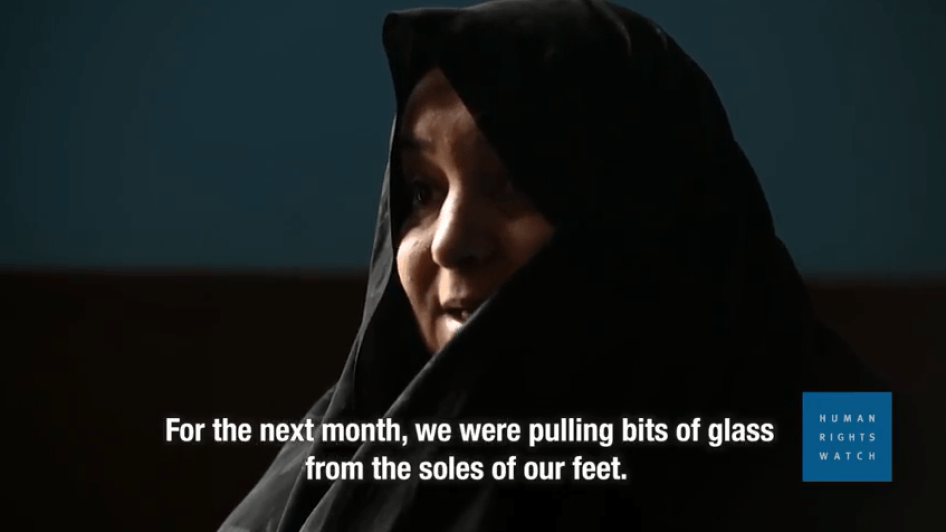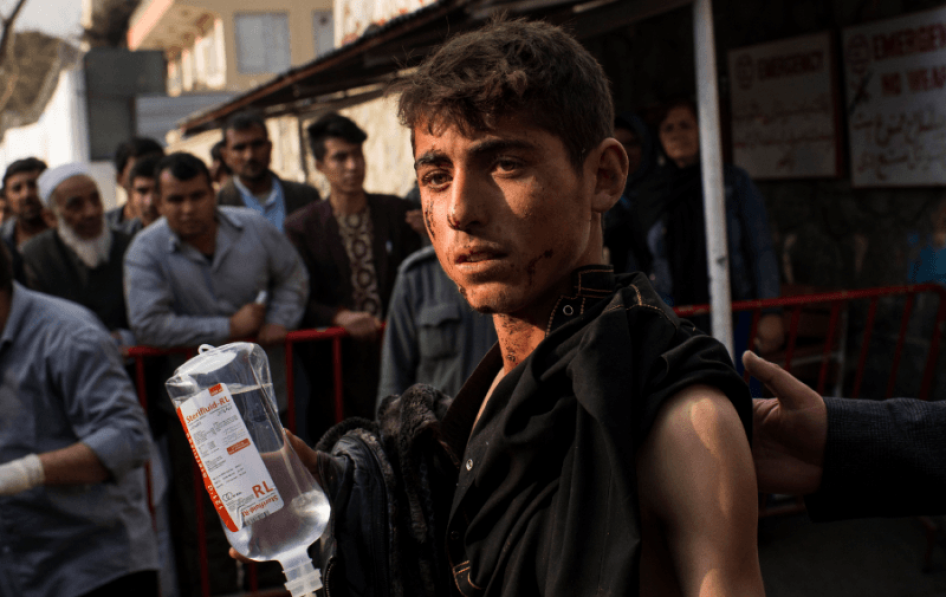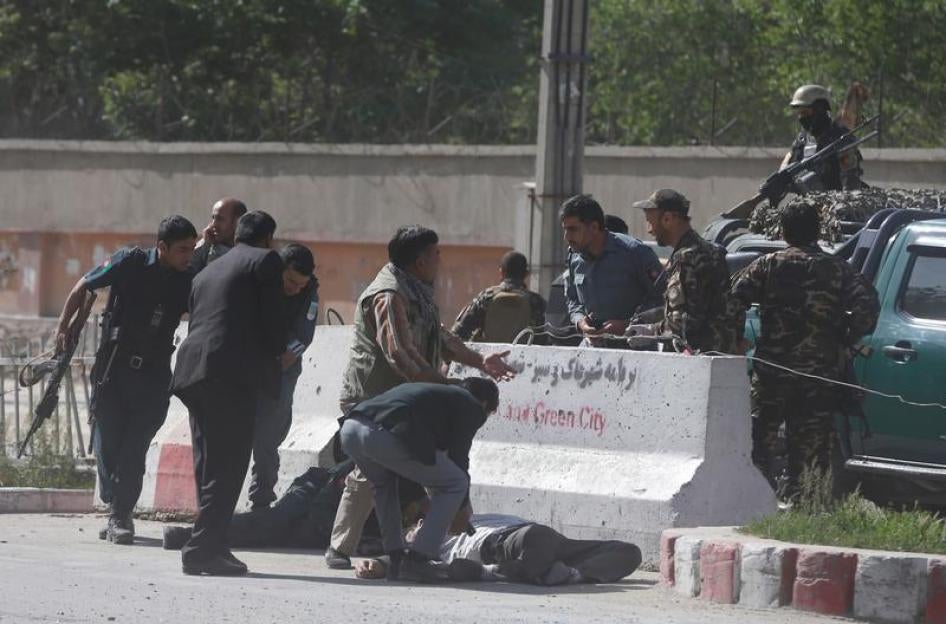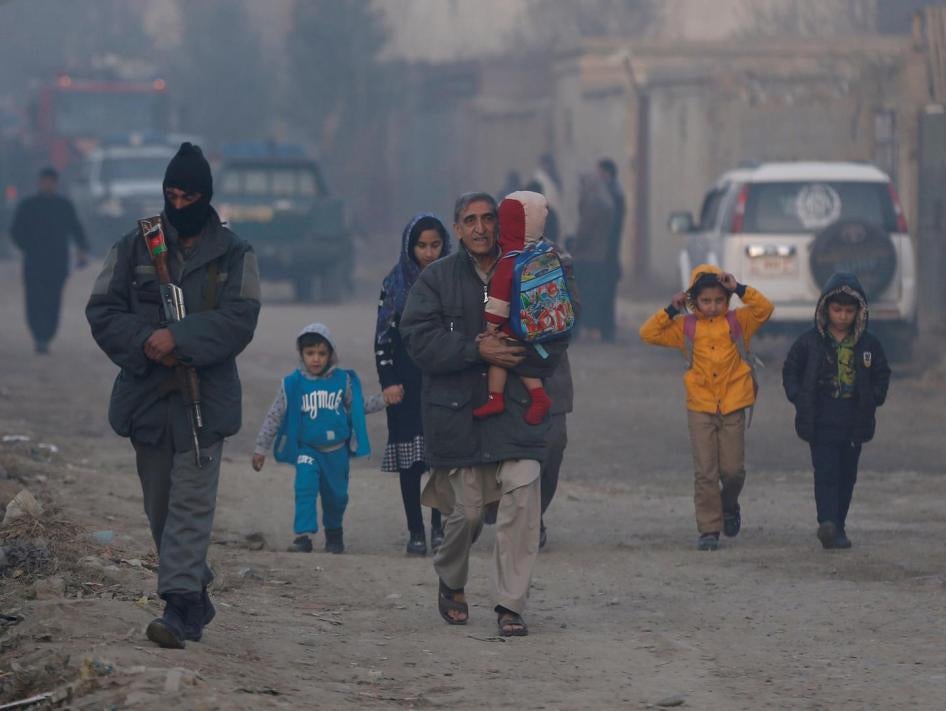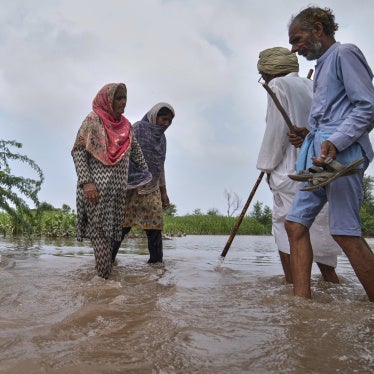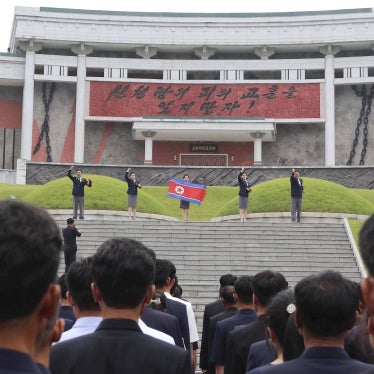Bloodied faces. Mangled metal. Lifeless, unidentified victims being piled into ambulances. These terrible images of suicide attacks in Afghanistan have become all too familiar. Barely a week goes by without news of another atrocity, scenes of death and destruction, and grim reports of overwhelmed hospitals and a rising civilian death toll. But once the news cycle moves on, what next? How do survivors and grieving families cope? A new report on insurgent attacks on civilians in Afghanistan, “No Safe Place,” shows what it’s like for those directly affected by the country’s armed conflict.
It was a typically dry, hot August evening in Herat, Afghanistan’s third largest city. Worshippers were gathering at Jawadiya Mosque for evening prayers and Sima, one of the mosque’s female caretakers, had joined the others praying in the women’s section. Suddenly everything went black. Sima was knocked unconscious by a powerful explosion, caused by a suicide bomber detonating an explosive vest. When she came to she saw smoke filling the hall and women worshippers rushing to escape. Pulling her two young daughters into her arms, Sima joined them.
“That scene – I hope God never shows it to you,” she said, recalling how she clambered over the dead and dying to escape. “No one should see such a day, not even my enemy.”
Body parts were scattered everywhere. “It was horrific,” said Sima. “One piece of a body was in one place, another piece elsewhere. Everyone was crying.”
When Human Rights Watch’s senior Afghanistan researcher, Patricia Gossman, met Sima four months after the August 1, 2017 attack, Sima initially seemed poised. But as she sat down to tell her story, the mask slipped.
“She was distraught,” said Patricia. “It’s clear she’s really struggling.”
While Sima’s physical injuries were relatively minor – she was treated for shoulder injuries after a door fell on her as she fled – she has terrible flashbacks and has developed a mental health condition. Sima’s husband is unwell, so she is the main breadwinner, with a salary that barely permits the family of five to get by. She’s already had to return to work at the mosque where she almost died, and it’s taking a toll. “She’s very alone,” Patricia said. “The financial burden is enormous.”
Sima’s story is not unique. The Afghan government has a policy of paying those injured in insurgent attacks 50,000 Afghani (US$750), and families of those killed double that. But the paperwork to claim this compensation is so difficult to navigate – including because many victims cannot read or write – that many people never get the help they need. Families who lose breadwinners slip instantly from barely getting by, to not coping at all. And while some level of emergency medical care is generally available in urban areas, it’s a different story for those with complex medical needs, or the many survivors who cannot access mental health services.
“It just adds to people’s misery,” Patricia said. “There’s only a handful of psychologists for a country that has been at war for 40 years. The need is enormous.”
The need is growing, too. Since 2016, insurgent groups have sharply escalated their attacks in urban areas, killing and injuring thousands of civilians. The Taliban has been responsible for some particularly massive attacks in Kabul. An attack in January, in which they detonated an ambulance rigged with explosives, killed more than 100 people – almost all civilians.
The insurgents who claimed responsibility for the Herat mosque attack, however, were part of the Islamic State of the Khorasan Province, Afghanistan’s branch of the Islamic State. The group has a stronghold in Nangarhar province in eastern Afghanistan, where the US has targeted its forces in airstrikes. The group has increasingly attacked urban areas. Sworn enemies of both the Taliban and Afghan government forces, their “calling card” is targeted attacks on the country’s minority Shia community.
“People used to talk of the ‘fighting season’ in Afghanistan, but with attacks in cities you don’t need to wait for the snow in the mountains to melt,” Patricia said. “The horrible truth is that there’s little cost to these groups to send someone to blow himself up in a mosque.”
By their arbitrary nature, suicide bomb attacks claim victims from all walks of life. Among the survivors Patricia interviewed were a woman who was making lunch at home, an office worker whose ceiling collapsed on him, and a tailor whose hands were badly burned.
“What also struck me is how many victims are the very poorest people – those working on the streets, like street kids, cobblers, or food vendors. They have no protection.”
Some of the most devastating stories Patricia has heard concern the chaotic scenes as families tried to find loved ones after an explosion.
“Families describe going from hospital to hospital trying to find their relatives, seeing terrible wounds and burns. They hope their loved one will just be injured. But then they end up in the morgue, sometimes digging through the body bags themselves.”
To add to the heartbreak, some victims are never found. The blast force of explosive devices can be so great that there is no body left to bury.
For Patricia, who has spent years working on Afghanistan, the stories can be painfully close to home. The day we speak it is just 48 hours after a suicide bombing at a voter registration center in Kabul, and she has already spoken to three people she knows who lost relatives in that attack.
“It’s a very tough place to be. Many people I know are trying to find a way to get their families out. It’s different for me – I can always leave. Most people I know cannot.”
The January ambulance attack took place just meters from a photojournalist Human Rights Watch was working with for our report. He was in a shop buying a carpet for a friend when the bomb went off.
“He texted me saying ‘it’s getting too close now’ and confirmed he was ok, and then went outside to help carry victims to the nearby hospital and tie two or three tourniquets. He walked home covered in other people’s blood. Our report includes some of the shocking pictures he took that day.”
With parliamentary elections now due in October, Afghans are braced for a bloody summer. They feel exhausted not only from the endless violence, but from their efforts to stay safe. The nature of the attacks means those who die are often just in the wrong place at the wrong time. In the recent attack at the voter registration center, five victims were young children on their way to school. “This is a parent’s worst nightmare,” Patricia said. “But what do you do? Not let your kids go to school? There’s no sense of a safe place. You simply don’t know where the next attack will be.”
The sectarian aspects of the uptick in violence – attacks targeting Shia, including a new strategy of hitting mosques – has added to the horror. There is widespread revulsion in Afghanistan to these attacks, and the concern that they could fuel more sectarian violence.
For Sima, her daily struggles continue. She had to sell the small amount of aid she was given – rice, oil, and flour – to pay to treat her injured shoulder, but she still needs surgery she can’t afford. She’s also struggling to make her rent.
She is haunted by the sights she saw that day and remembers how she spent weeks picking pieces of glass out of her feet and hair.
“It’s been four months now and I haven’t seen a happy day since,” she said. “Sometimes I just want to cry and shout.”

